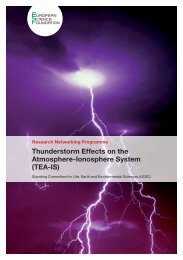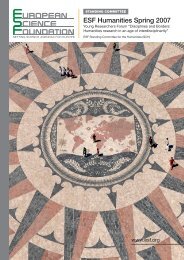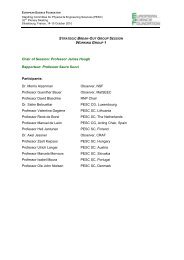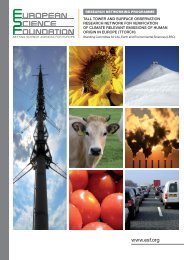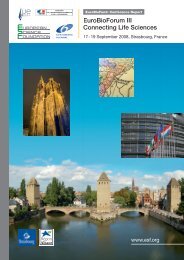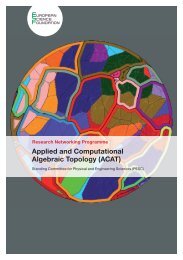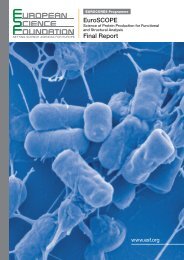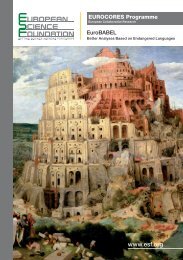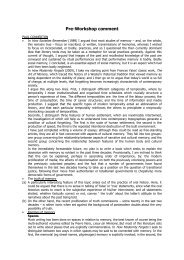European Peer Review Guide - European Science Foundation
European Peer Review Guide - European Science Foundation
European Peer Review Guide - European Science Foundation
You also want an ePaper? Increase the reach of your titles
YUMPU automatically turns print PDFs into web optimized ePapers that Google loves.
34<br />
<strong>European</strong> <strong>Peer</strong> <strong>Review</strong> <strong>Guide</strong><br />
e.g., commenting on the number of researchers and<br />
graduate students to be employed, procurement of<br />
major equipment and access to infrastructure. This<br />
information can be used by the funding organisation<br />
as part of their final decision and during their<br />
negotiations with the applicants.<br />
• Make conscious and clear decisions at the outset<br />
during the preparatory phase on whether or not the<br />
funding organisation will scrutinise and possibly<br />
make changes to the requested budgets. If such<br />
changes are part of the process, the eligibility of all<br />
cost items needs to be specified in the call, including<br />
possible limits or other conditions that may apply to<br />
individual items or the overall requested amounts.<br />
Recommendations<br />
• Discretionary and ad hoc adjustments of the<br />
requested budgets by members of staff at the<br />
funding organisations should be avoided as much<br />
as possible.<br />
• If negotiations and changes are to be included as<br />
part of the process, the expert assessors’ views<br />
must be used as much as possible as the basis<br />
for refining the funding allocations. Organisations’<br />
dedicated scientific boards, councils and<br />
committees could also provide input as appropriate.<br />
As part of the negotiations and grant agreements,<br />
the following elements could also be considered:<br />
• Clarification of the Intellectual Property Rights<br />
(IPR) directly generated under the contract, depending<br />
on the nature of the research being funded (e.g.,<br />
commercialisation potential and value);<br />
• Care must be given as the details and stringency of<br />
the agreements defining the ownership of the IPR<br />
by various parties involved (researchers, research<br />
institutes and the funders) may be applied<br />
differently. This becomes more critical when programmes<br />
are multinational or multi-agency;<br />
• IPR may (depending on the nature of the research)<br />
include and delineate both the Foreground and<br />
the Background Intellectual Properties;<br />
• Engage (when necessary) the parties in licensing<br />
or commercialisation agreements on the generated<br />
Intellectual Properties;<br />
• Reporting requirements: frequency, scope, format,<br />
etc.;<br />
• Adherence to any other national, <strong>European</strong> or<br />
international directives, regulations or good practices<br />
in research;<br />
• Ex-post evaluation requirements: nature, frequency,<br />
format, required self-evaluation reports, etc.<br />
4.9 Communication<br />
Communication is a crucial element required across<br />
the entire process of peer review described in the<br />
previous sections. In order to safeguard the integrity<br />
of the process, it is necessary that all the implicated<br />
parties in the process are clearly informed of the<br />
process, procedures and decisions.<br />
• Communication should occur in a timely fashion.<br />
• Communication should be effective in delivering<br />
the right message to the correct recipients.<br />
• Communication should be efficient (both concise<br />
and clear).<br />
4.9.1 Communication to applicants<br />
During the peer review process communication with<br />
the applicants is of crucial importance. Effective<br />
and timely feedback to the applicants determines<br />
to a large extent the level of transparency of the<br />
process. Some of the items needing attention are<br />
listed below:<br />
• Acknowledgment of receipt of proposal – immediately<br />
after submission;<br />
• If required, intermediate communication to the<br />
applicants informing them of possible incompleteness<br />
of their application or lack of successful<br />
submission (especially when this is due to technical<br />
issues such as IT tools and resources);<br />
• Communication for further information (if applicable);<br />
• Communication on eligibility requirements and<br />
status (if applicable);<br />
• Communication on the right to reply (if applicable);<br />
• Communication on the decision of the review<br />
panel;<br />
• Communication on the final decision;<br />
• Communication on redress applications and their<br />
outcome (if applicable).<br />
4.9.2 Communication to experts<br />
The individual/remote reviewers, as well as the<br />
members of the review panels and any other committees<br />
or boards that may be involved in making<br />
decisions, should be informed of all the main elements<br />
and steps of the programme they take part<br />
in as well as the detailed description of their assignment,<br />
roles and responsibilities. The following items<br />
should be considered:<br />
• Maintain the right balance between providing<br />
necessary and useful information without overdoing<br />
it;<br />
• Divide the information to be communicated into<br />
two groups:




